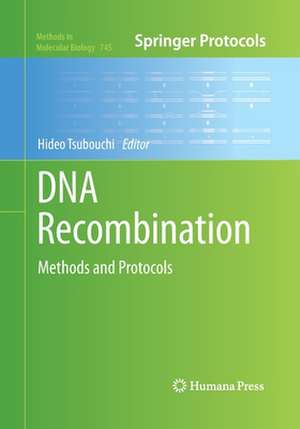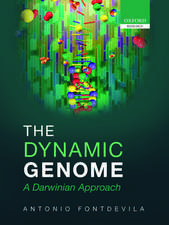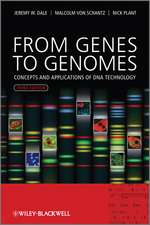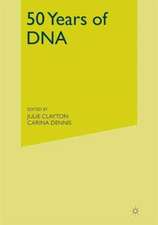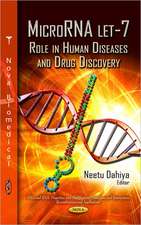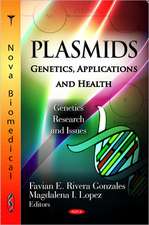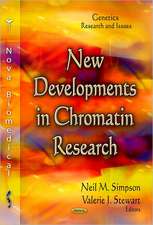DNA Recombination: Methods and Protocols: Methods in Molecular Biology, cartea 745
Editat de Hideo Tsubouchien Limba Engleză Paperback – 23 aug 2016
Authoritative and easily accessible, DNA Recombination: Methods and Protocols serves as an ideal guide to scientists of all backgrounds with its well-honed methodologies and strives to bring the reader to the next level of understanding regarding this vital subject.
| Toate formatele și edițiile | Preț | Express |
|---|---|---|
| Paperback (1) | 928.18 lei 6-8 săpt. | |
| Humana Press Inc. – 23 aug 2016 | 928.18 lei 6-8 săpt. | |
| Hardback (1) | 1316.96 lei 6-8 săpt. | |
| Humana Press Inc. – 9 iun 2011 | 1316.96 lei 6-8 săpt. |
Din seria Methods in Molecular Biology
- 9%
 Preț: 791.63 lei
Preț: 791.63 lei - 23%
 Preț: 598.58 lei
Preț: 598.58 lei - 20%
 Preț: 882.98 lei
Preț: 882.98 lei -
 Preț: 252.05 lei
Preț: 252.05 lei - 5%
 Preț: 802.70 lei
Preț: 802.70 lei - 5%
 Preț: 729.61 lei
Preț: 729.61 lei - 5%
 Preț: 731.43 lei
Preț: 731.43 lei - 5%
 Preț: 741.30 lei
Preț: 741.30 lei - 5%
 Preț: 747.16 lei
Preț: 747.16 lei - 15%
 Preț: 663.45 lei
Preț: 663.45 lei - 18%
 Preț: 1025.34 lei
Preț: 1025.34 lei - 5%
 Preț: 734.57 lei
Preț: 734.57 lei - 18%
 Preț: 914.20 lei
Preț: 914.20 lei - 15%
 Preț: 664.61 lei
Preț: 664.61 lei - 15%
 Preț: 654.12 lei
Preț: 654.12 lei - 18%
 Preț: 1414.74 lei
Preț: 1414.74 lei - 5%
 Preț: 742.60 lei
Preț: 742.60 lei - 20%
 Preț: 821.65 lei
Preț: 821.65 lei - 18%
 Preț: 972.30 lei
Preț: 972.30 lei - 15%
 Preț: 660.49 lei
Preț: 660.49 lei - 5%
 Preț: 738.41 lei
Preț: 738.41 lei - 18%
 Preț: 984.92 lei
Preț: 984.92 lei - 5%
 Preț: 733.29 lei
Preț: 733.29 lei -
 Preț: 392.60 lei
Preț: 392.60 lei - 5%
 Preț: 746.26 lei
Preț: 746.26 lei - 18%
 Preț: 962.66 lei
Preț: 962.66 lei - 23%
 Preț: 860.22 lei
Preț: 860.22 lei - 15%
 Preț: 652.64 lei
Preț: 652.64 lei - 5%
 Preț: 1055.50 lei
Preț: 1055.50 lei - 23%
 Preț: 883.87 lei
Preț: 883.87 lei - 19%
 Preț: 491.89 lei
Preț: 491.89 lei - 5%
 Preț: 1038.86 lei
Preț: 1038.86 lei - 5%
 Preț: 524.16 lei
Preț: 524.16 lei - 18%
 Preț: 2122.34 lei
Preț: 2122.34 lei - 5%
 Preț: 1299.23 lei
Preț: 1299.23 lei - 5%
 Preț: 1339.12 lei
Preț: 1339.12 lei - 18%
 Preț: 1390.26 lei
Preț: 1390.26 lei - 18%
 Preț: 1395.63 lei
Preț: 1395.63 lei - 18%
 Preț: 1129.65 lei
Preț: 1129.65 lei - 18%
 Preț: 1408.26 lei
Preț: 1408.26 lei - 18%
 Preț: 1124.92 lei
Preț: 1124.92 lei - 18%
 Preț: 966.27 lei
Preț: 966.27 lei - 5%
 Preț: 1299.99 lei
Preț: 1299.99 lei - 5%
 Preț: 1108.51 lei
Preț: 1108.51 lei - 5%
 Preț: 983.76 lei
Preț: 983.76 lei - 5%
 Preț: 728.16 lei
Preț: 728.16 lei - 18%
 Preț: 1118.62 lei
Preț: 1118.62 lei - 18%
 Preț: 955.25 lei
Preț: 955.25 lei - 5%
 Preț: 1035.62 lei
Preț: 1035.62 lei - 18%
 Preț: 1400.35 lei
Preț: 1400.35 lei
Preț: 928.18 lei
Preț vechi: 977.04 lei
-5% Nou
Puncte Express: 1392
Preț estimativ în valută:
177.66€ • 193.05$ • 149.33£
177.66€ • 193.05$ • 149.33£
Carte tipărită la comandă
Livrare economică 21 aprilie-05 mai
Preluare comenzi: 021 569.72.76
Specificații
ISBN-13: 9781493957781
ISBN-10: 1493957783
Pagini: 565
Ilustrații: XIV, 565 p.
Dimensiuni: 178 x 254 mm
Greutate: 0.99 kg
Ediția:Softcover reprint of the original 1st ed. 2011
Editura: Humana Press Inc.
Colecția Humana
Seria Methods in Molecular Biology
Locul publicării:Totowa, NJ, United States
ISBN-10: 1493957783
Pagini: 565
Ilustrații: XIV, 565 p.
Dimensiuni: 178 x 254 mm
Greutate: 0.99 kg
Ediția:Softcover reprint of the original 1st ed. 2011
Editura: Humana Press Inc.
Colecția Humana
Seria Methods in Molecular Biology
Locul publicării:Totowa, NJ, United States
Cuprins
Methods to Study Mitotic Homologous Recombination and Genome Stability.- Characterizing Resection at Random and Unique Chromosome Double-Strand Breaks and Telomere Ends.- Characterization of Meiotic Recombination Initiation Sites Using Pulsed-field Gel Electrophoresis.- Genome-Wide Detection of Meiotic DNA Double-Strand Break Hotspots Using Single-stranded DNA.- Detection of Covalent DNA-Bound Spo11 and Topoisomerase Complexes.- Molecular Assays to Investigate Chromatin Changes during DNA Double-Strand Break Repair in Yeast.- Analysis of Meiotic Recombination Intermediates by Two-Dimensional Gel Electrophoresis.- Mapping of Crossover Sites Using DNA Microarrays.- Using the Semi-Synthetic Epitope System to Identify Direct Substrates of the Meiosis-Specific Budding Yeast Kinase, Mek1.- Genetic and Molecular Analysis of Mitotic Recombination in Saccharomyces cerevisiae.- In vivo Site-Specific Mutagenesis and Gene Collage Using the Delitto Perfetto System in Yeast Saccharomyces cerevisiae.- Detection of RNA-Templated Double-Strand Break Repair in Yeast.- SNP-Based Mapping of Crossover Recombination in C. elegans.- Characterization of Meiotic Crossovers in Pollen from Arabidopsis thaliana.- Isolation of Meiotic Recombinants from Mouse Sperm.- Homologous Recombination Assay for Interstrand Crosslink Repair.- Evaluation of Homologous Recombinational Repair in Chicken B Lymphoma Cell Line, DT40.- Understanding the Immunoglobulin Locus Specificity of Hypermutation.- Quality Control of Purified Proteins Involved in Homologous Recombination.- Assays for Structure-Selective DNA Endonucleases.- In vitro Assays for DNA Pairing and Recombination-Associated DNA Synthesis.- An In vitro Assay for Monitoring the Formation and Branch Migration of Holliday Junctions Mediated by aEukaryotic Recombinase.- Reconstituting the Key Steps of the DNA Double-Strand Break Repair In vitro.- Biochemical Studies on Human Rad51-Mediated Homologous Recombination.- Studying DNA Replication Fork Stability in Xenopus Egg Extract.- Supported Lipid-Bilayers and DNA Curtains for High-Throughput Single Molecule Studies.- FRET-Based Assays to Monitor DNA Binding and Annealing by Rad52 Recombination Mediator Protein.- Visualization of Human Dmc1 Presynaptic Filaments.- Tracking of Single and Multiple Genomic Loci in Living Yeast Cells.- Cell Biology of Homologous Recombination in Yeast.- Live Cell Imaging of Meiotic Chromosome Dynamics in Yeast.- Chromosome Structure and Homologous Chromosome Association during Meiotic Prophase in C. elegans
Textul de pe ultima copertă
Homologous recombination is important in various aspects of DNA metabolism, including damage repair, replication, telomere maintenance, and meiosis, and yeast genetics has successfully provided a framework for the mechanism of homologous recombination. Divided into four convenient sections, DNA Recombination: Methods and Protocols covers recent techniques that best utilize the advantages of the yeast system, prescribing to the belief that yeast will keep serving as a great model organism to study homologous recombination. Chapters have also been included for such exceptions as the group of genes involved in recombination that are found solely in higher eukaryotes, such as BRCA2. And looking forward, a necessary step in the direction of understanding the homologous recombination process is to isolate the machine and let it work in a test tube. Understanding the design by studying the appearance and behavior of the machinery as a single molecule will be an important milestone toward understanding the mechanism of action of the machinery. Techniques covering these topics have also been included. Written in the successful Methods in Molecular Biology™ series format, chapters include introductions to their respective topics, lists of the necessary materials and reagents, step-by-step, readily reproducible protocols, and notes on troubleshooting and avoiding known pitfalls.
Authoritative and easily accessible, DNA Recombination: Methods and Protocols serves as an ideal guide to scientists of all backgrounds with its well-honed methodologies and strives to bring the reader to the next level of understanding regarding this vital subject.
Authoritative and easily accessible, DNA Recombination: Methods and Protocols serves as an ideal guide to scientists of all backgrounds with its well-honed methodologies and strives to bring the reader to the next level of understanding regarding this vital subject.
Caracteristici
Includes cutting-edge methods and protocols Provides step-by-step detail essential for reproducible results Contains key notes and implementation advice from the experts Includes supplementary material: sn.pub/extras
